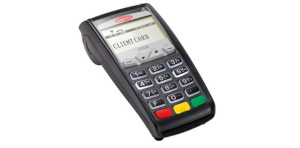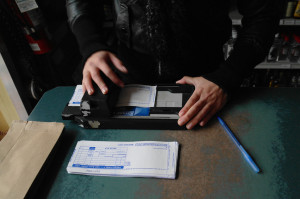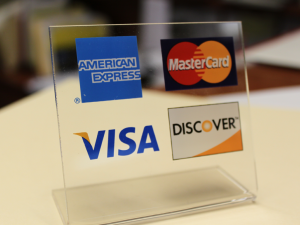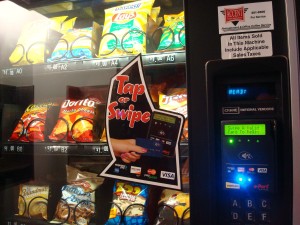October 10th, 2013 by Elma Jane
There are various payment processing rates that apply to credit and debit card transactions. Visa and MasterCard do not publish their rules and regulations or the payment processing standards required to get the lowest interchange rate. It’s up to credit card processing companies to understand and implement them to their merchants’ benefit. A high downgrade rate may indicate that your processor does not know the standards, or may be reluctant to implement best practices or new rules changes. The application of these rates is based on a variety of factors related to the particular circumstances of the sale and the way the payment is processed, as well as on the type of the card that was used. Typically payments processed in a card-not-present environment (e.g. online or over the phone) are assessed higher processing fees than payments processed in a face-to-face setting. Payments made with regular consumer types of cards are generally processed at lower rates than payments made with rewards, business-to-business or commercial cards. Debit cards are processed at lower interchange rates than credit cards. In order to simplify the pricing for their merchants, the majority of the processing companies have elected to use various tiered pricing models (two-tiered, three-tiered, six-tiered, etc.). There are three general classifications used in the various tiered pricing models:
Qualified Transaction (also referred to as the Swiped Rate) This is the rate charged per each transaction when the card is physically swiped through a credit card terminal. When a transaction is processed in accordance with the rules and standards established in the Payment Processing Agreement, signed by the merchant and the processing bank, and It involves a regular consumer credit card, It is processed at the most favorable rate. This rate is called a “Qualified Rate” and is set in the merchant’s Payment Processing Agreement. The Qualified Rate is set based on the way a merchant will be accepting a majority of their credit cards. For example, for an internet-based merchant, the internet interchange categories will be defined as Qualified, while for a physical retailer only transactions where cards are swiped through a terminal will be Qualified.
Mid-Qualified Transaction This is the rate charged when a transaction is manually keyed-in using AVS – Address Verification Service (card #, expiration date, address, zip code and CVV code all match). When a consumer credit card is keyed into a credit card terminal instead of being swiped or The cardholder uses a rewards card, business-to-business or another special type of card the transaction is charged a discount rate that is less favorable than the Qualified. This rate is called a “Mid-Qualified Rate.”
Non-Qualified Transaction This is the rate charged when manually keying-in a transaction without using AVS – Address Verification Service. When a special kind of credit card is used (like a rewards card or a business card), or a payment is not processed in accordance with the rules established in the Payment Processing Agreement, or It does not comply with some applicable security requirements.
Qualified Transaction Conditions
One electronic authorization request is made per transaction and the transaction/purchase date is equal to the authorization date. The authorization response data must also be included in the transaction settlement. The authorization transaction amount must match the settled (deposit) transaction amount. The card that is used is not a commercial (business) credit card The credit/debit card is present at the time of the transaction, the card’s full magnetic stripe is read by the terminal, and a signature is obtained from the cardholder at the time of the transaction.
The transaction must be authorized and settled under a standard retail industry code.
The transaction must be electronically deposited (batch transmitted) no later than 1 day from transaction/purchase/authorization date.
Mid-Qualified Transaction Conditions
One or more of the Qualified conditions were not met
Non-Qualified Transaction Conditions
One or more of the Qualified conditions were not met, or The card that was used was a commercial card without submitting the additional data or:
The transaction was electronically deposited (batch transmitted) greater than 1 day from the authorization date, or:
The transaction was not electronically authorized, or the authorization response data was not included in the transaction settlement.
Posted in Best Practices for Merchants, Credit card Processing, Electronic Payments, Financial Services, Merchant Services Account Tagged with: account, authorization, authorized, best, business, card, card-not-present, credit, cvv, debit, downgrade, interchange, keying, lowest, MasterCard, merchant, payment, processed, Processing, qualified, rate, rewards, standards, swiped, transaction, visa
October 3rd, 2013 by Elma Jane
National Transaction Gift Card Programs
Features & Benefits
Why National Transaction Gift Card? A gift card program offers you a great opportunity to boost sales by increasing customer loyalty and enhancing your business brand. Gift cards are used like credit cards and can be loaded with any dollar amount. NTC offers customized gift card processing merchant services tailored to your gift card processing needs. It’s secured and easy to manage.
Benefits to Consider:
Brand Building and Loyalty Gift cards can be a great source of advertising for your business. Gift cards are re-loadable; customers often reload them and continue to use them.
Cash Flow Enhancement Prepaid gift cards are purchased prior to customers receiving their goods and services from you. You can re-invest these dollars back into your business. Earn money; research shows that customers tend to spend more than the value of the gift card.
Easy to Manage Merchant gift cards are easy for your customers to use and easy for your employees to issue and redeem, as they work similar to credit cards.
Eliminate or Remove Cashback Don’t have to use the full balance of the card – the balance remains on the card. It can be issued for returned merchandise, thereby reducing fraud. Gift cards can only be activated by swiping through a POS terminal.
Get and Bring New Customers Using gift cards as presents (e.g. Showers, Mother’s Day, Birthdays, Graduation and Christmas) is more popular than ever before. Offering a gift card program can help bring new customers to your business, thereby increasing sales.
Increasing Brand Awareness Gift cards customized with your business name or logo are an effective way to advertise your business and leave a lasting impression with customers.
Electronic gift card vs paper certificates? An electronic gift card solution provides a number of benefits over certificates, such as:
Minimize Fraud – card are difficult to duplicate while paper certificates can be photocopies or duplicated. Save Money – cards can be reloaded. Paper certificates can only be used once. Save Time and Maximize Efficiency – gift cards can be loaded and redeemed easily, and provide electronic reporting. Paper certificates require manual work.
NTC Gift Card Operations How does a Gift Card work? Cards are activated through your NTC merchant account with a dollar value requested by your customer and not dependent on things like proprietary equipment. Once the card is activated, it’s ready to use as payment at your location.
Are my Gift Cards reloadable? Yes, and may be reloaded as many times as you wish. You may consider offering an incentive to thank your customers for their loyalty. Incentives can range from providing a free product or service from your store.
What NTC Merchant Services terminals do I need to process NTC Gift Cards?
Your NTC Gift Card will function on any Standalone, Wireless and Bluetooth terminals.
Card Ordering/Design
What is the standard gift card size? Most gift cards are the exact same size as a credit card:
What options do I have to advertise my business name on my cards?
To help promote and advertise your business brand on your cards, you can choose one of these options:
Basic – Include your company’s name, address and phone number on a pre-selected style. Standard – You can choose from an attractive selection of pre-designed card styles. Add a single color logo or customized text in your choice of font style and color.
Custom Cards – Custom cards designed by you or with our help, invest with style.
How long does it take for me to be set-up and receive my gift cards?
Your application and set-up on NTC systems will take approximately 5 – 7 business days. Non-peak times (outside Christmas) – 2 weeks Peak times – 4 to 6 weeks
How many cards I can order? Quantities of 50 for Basic, 100, 1,000 for Standard.
Posted in Best Practices for Merchants, Electronic Payments, Gift & Loyalty Card Processing, Merchant Services Account Tagged with: advertising, bluetooth, certificates, credit cards, earn, electronic, function, gift, gift Card, loyalty, merchant account, ntc, payment, POS, Processing, re-loadable, reload, reporting, secured, standalone, Swiping, terminal, terminals, value, wireless
September 30th, 2013 by Admin
Credit card processing involves three separate cost components for vendors who choose to accept this type of payment from customers for goods or services. The same cost components apply to debit cards. Only one cost component is negotiable.
The first component is an interchange fee, which is payable to the card holder’s issuing bank. It is a combination of a transaction volume percentage fee and a flat-rate transaction fee. Interchange fees are collectively agreed upon through Visa and MasterCard by a card’s issuing bank and are fixed costs.
Interchange fees take into consideration various information about a card. Types of cards include debit and credit, while categories of cards refer to commercial and reward cards. Processing methods include whether a card is swiped or manually keyed. Swiping a card is usually more economical for vendors.
Secondly, an assessment fee is charged by the card’s brand holder. Brand holders include Visa, MasterCard and Discover. Assessment fees are also fixed costs. Additionally, Visa charges a monthly fee.
The final charge is known as a processing fee. Processing fees vary among processors and is negotiable. Vendors are charged a processing fee, which can cause a difference in cost from one vendor to another. More credit card information: TopTenReviews
Jeremy is a tech blogger at TopTenReviews. He lives outside Salt Lake City, Utah
Posted in Best Practices for Merchants, Credit card Processing, Electronic Payments, Merchant Services Account, Visa MasterCard American Express Tagged with: accept, assessment, cost, credit card processing, debit cards, fees, flat-rate, interchange, keyed, payment, Processing, Rates, swiped, Swiping, transaction, volume
September 26th, 2013 by Elma Jane
Asta‘s Global Convention held in Miami FL, September 16-19, 2013 with National Transaction Corporation’s President, Mr. Mark Fravel in the Guest List.

ASTA American Society of Travel Agents and Agencies
With ASTA’s Global Convention held last September 16-19, 2013 in Miami Florida, National Transaction Corporation accessed to a powerful and inspirational collection of unrivalled 36 speakers including…Hilary Rodham Clinton, Former Secretary of State and Former U.S. Senator from New York. With high quality travel industry content and peer-to-peer networking opportunities, National Transaction Corporation’s Business has moved forward through these thought provoking sessions, breakouts and networking events.
Headed by NTC’s President, Mr. Mark Fravel, together with his Account Executives; Chelsie Fravel, Megan Fravel and Richard Delos Santos, they actively attended all the sessions that are involved in the Convention. National Transaction Corporation handed out around 300 Business Cards with Micro Screen Cleaner as part of their promotional giveaways in their very own NTC booth.
With the opportunity for over 1,400 ASTA CEOs, Presidents and Agency Owners that has come together with leading travel suppliers, the Convention influenced critical issues of our day. Engaged in instructive and new media technologies that impact our industry and shared innovative ideas with like-minded professionals. NTC a Credit Card/Electronic Payment Processing Merchant Account Services get to meet key people for Sabre, a Global Distribution System which products and services enable agencies to streamline accounting processes, build a powerful marketing database, and send targeted marketing pieces with measurable results. With the convention GUEST LIST which includes NTC and other Business Agencies and Companies like Car Rental, Cruise, Hotel, Insurance, Marketing Magazine, Travel, and a lot more are the individuals in which you want to meet and build your organization’s future.
With the ASTA Global Convention, it unites members and travel industry professionals to create a conference for the most influential buyers in the industry. As the leading advocate for travel agents, the travel industry and the traveling public, ASTA and its members represent 80% of all travel sold by travel agencies in the United States.
The ASTA Global Convention is reaching new heights through innovative education, captivating luminaries and diverse networking opportunities. ASTA continues to promote travel around the globe and to remind the traveling public of the value of professional services provided by travel agents and tour operators.
Posted in Travel Agency Agents Tagged with: agencies, agency, agent, airline, ASTA, car rental, clinton, credit card, cruise, hillary, hotel, Mark Fravel, merchant account, National Transaction Corporation, Processing, travel
August 19th, 2013 by Admin
1. Use newer POS systems to reduce credit card fees.
2. Find out what percentage of your gross sales go toward credit card rates.
3. Perform a statement review at least annually.
Any time a customer uses a credit card to purchase services and goods the merchant pays various rates and fees processing those transactions. Most of these fees go to the bank issuing the credit card as they take on the bulk of the risk in credit card transactions. Visa, American Express and Discover own the network on which these credit card transactions are processed on and they receive part of the fee and percentage rate as well as establish these rates and fees. Finally the bank that provides merchant account services gets part of these rates and fees.
To a small business 2, 3, or even 4% might not sound like much but when these fees are on the gross total of sales they can be significantly higher than originally thought. For this reason it’s a great idea to assess your merchant account statement to see if rates are in line and that your most frequently used cards and transaction types are getting the best rate possible. By going over your statement, you can see exactly what you pay per transaction and get details about your most common transaction types and credit card used to get the process going. Knowing how to untangle the various levels of pricing rates and fees can be daunting if you don’t know what they mean. If you are unfamiliar with what these rates and fees mean on your statement companies like National Transaction can perform the review for you. Free of charge.
Ultimately the best thing to have is a merchant account service provider that will take the time to go over your business with an eye lowering your rates and fees. The savings can be significant. As a business grows it changes and there should be an ongoing strategy at maintaining the best processing rates and fees possible. Today with so many different credit card types, like rewards cards, airline miles programs and more it can pay off to check once or twice a year.
Posted in Best Practices for Merchants, Credit card Processing, Electronic Payments, Merchant Services Account Tagged with: account, American Express, bank, card, credit, fees, MasterCard, merchant, process, Processing, Rates, services, Visa MasterCard American Express
August 16th, 2013 by Admin
 Square credit card processing service was fined $507,000 by Florida’s Office of Finance Regulation for operating an electronic payment processing service without a money transmission license. Some may remember the same treatment in Illinois in March of this year. The order covers two years of operation and processing including Square Register, stored value and prepaid access credit card services.
Square credit card processing service was fined $507,000 by Florida’s Office of Finance Regulation for operating an electronic payment processing service without a money transmission license. Some may remember the same treatment in Illinois in March of this year. The order covers two years of operation and processing including Square Register, stored value and prepaid access credit card services.
Square was granted a money transmission license after it paid the fine via wire transfer and is now in compliance. Square neither admits or denies any wrongdoing. Although it’s an emerging field the Florida based fines show that adhering to state laws is a tricky situation that needs extra scrutiny on the processors end. Due to the state by state nature of the laws, credit card processing companies find themselves complying with each state’s independent regulation laws.
In a statement from Square.. “We worked with Florida to resolve our application and receive our license to operate as a money transmitter in the state, We look forward to continuing to help merchants across Florida grow their business with Square.”
Posted in Credit card Processing, Electronic Payments, Mobile Payments, Mobile Point of Sale Tagged with: account, credit card, Florida, merchant, merchants, Processing, Square
China
People’s Online Daily is reporting that online electronic payment transactions carried out on Chinese mobile payment providers is expected to be above 9 Trillion yuan, which is $1.45 Trillion in U.S. Currency. China’s mobile electronic payments in 2012 were at 800 billion yuan. That sets an increase in mobile payments made on smartphones and tablets at 265% over the previous year. With more and more Chinese citizens coming online analysts say that the steady growth in the mobile payment landscape is expected to continue to rise well into 2020. Last year, mobile electronic payment transactions rose 66% to nearly 3.7 trillion yuan. Read more of this article »
Posted in Mobile Payments Tagged with: China, Digital Wallet, electronic payments, Illinois, India, mobile payment, mobile wallet, Processing, transactions

Ingenico iCT220 Credit Card Reader
Built on the Telium2 software platform, the iCT220 from Ingenico offers an operating system providing a secure standardized architecture for next generation Point of Sale or POS credit card reader terminals. Telium2 reinforces electronic payment security and integrates added features such as deleting sensitive data and terminal cut off. Dual processor architecture increases digital transaction speed. It also accommodates a wide range of electronic payment types. Read more of this article »
Posted in Electronic Payments Tagged with: credit card, electronic payment, point of sale, POS, Processing, terminal
Businesses looking to make an impact on their bottom line should take a look at the way they process electronic transactions. Today consumers view their transactions as an experience gravitating toward convenience. Long lines at the cash register can often turn away customers, sending them to competitors who might have more convenient ways to pay and therefore shorten time spent to complete the purchase. Impulse buyers are another reason to make sure that transactions go as smooth as possible increases the chance of future purchases. Read more of this article »
Posted in Electronic Payments Tagged with: account, application, electronic payments, electronic transactions, fees, merchant, process, process transactions, Processing, Rates

Cyber Crime InfoGraphic by Vericode.
Today anyone can have an e-commerce web site set up in mere minutes. There are a lot of open source e-commerce solutions that allow a web site owner to establish a site very easily, some require just a few clicks to get going. Once you have your color scheme chosen and your navigation all set a decision on how to accept payments is inevitable. e-commerce payment gateways allow your site to connect securely to a payment processor to accept your electronic transactions. These digital transactions can be used by hackers to target your site and your customers credit card information and much more. Whether the data targeted is stored on the merchants network or on the customers mobile device, business need to implement a cyber security strategy. Read more of this article »
Posted in Credit Card Security Tagged with: credit card, DSS, e-commerce, electronic, fraud, gateway, Malware, payment, PCI, Phishing, Processing, Security, Skimming, smartphone, SMSishing, tablet









